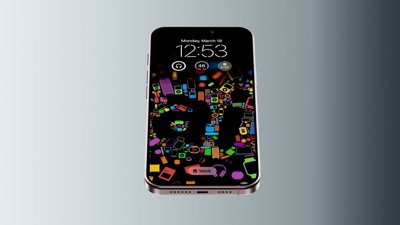Qualcomm's 5G iPhone modem is on the way out much faster than expected, as Apple is now projected to rapidly move to using its own version, despite previous reports of delays.
Apple bought Intel's 5G modem division for $1 billion in 2019, and at times has been said to be having difficulty, even to the extent that it was said to have abandoned its plans. More recently, however, it has been said that there will be two iPhones in 2025 which contain Apple's modem instead of Qualcomm's.
It was Kuo who reported that in July 2024. His latest report, though, projects how quickly he sees Apple replacing the Qualcomm modem.
My latest supply chain survey indicates that Apple's in-house 5G chip shipments will grow rapidly and replace Qualcomm's 5G chips. It's estimated that Apple's in-house 5G chip shipments will reach 35-40 million units in 2025, 90-110 million in 2026, and 160-180 million in 2027. https://t.co/miNhd324S9
— (Ming-Chi Kuo) (@mingchikuo) September 6, 2024
Kuo says this information comes from his supply chain sources, and he has a good track record for supply details.
In July, he said that the two models getting Apple's modem would be the entry-level iPhone SE 4, and the potentially high-end iPhone 17 Slim. The next iPhone SE is predicted to come in the first quarter of 2025, while the slim iPhone 17 will be announced in Apple's launch in September of the same year.
Apple's aim long been for its own technology to replace Qualcomm's, so that it has greater and exclusive control over yet more of the hardware it sells. Until Apple's model is ready, the company has been buying existing 5G modems from Qualcomm.
Most recently, it was said that Apple had bought a licence to use Qualcomm modems until at least March 2027. If Kuo is correct, though, Qualcomm will see a steep fall in its sales to Apple, as the iPhone maker is able to step up production.
The expected iPhone 17 Slim will not be released until the iPhone launch event in 2025. The September 9, 2024, "It's Glowtime" event is at least very unlikely to include the iPhone SE 4.
 William Gallagher
William Gallagher













 Charles Martin
Charles Martin




 Malcolm Owen
Malcolm Owen
 Andrew O'Hara
Andrew O'Hara








37 Comments
It is funny… at least for me. Although this came out of my head… someone could check.
For the last years… just the day before the launch of a new iPhone… Kuo launches a ‘news’ about the next year's cellphone!
Now… he is getting bolder… because it ‘announces’ something for 2047.
Long ago… some Apple Silicon Design's team said that they… ‘fixed the requirements for the design of the chip… three years in advance.’
We are in 2024… plus 3 years… 2027!
But it is funny how Kuo and Gurman… build up expectations… specially when there are no new news…
Apple is really getting rid of many third party components. Remember the initial CPU which was Samsung ARM? Gone. Apple designs them and makes them. Remember the GPU by PowerVR? Gone. Apple makes it. Remember Intel? Gone. Apple Silicon. Now, we're seeing that with 5G modem.
But at the same time, I can see why Apple's fed up with those competitors trying to capitalize on Apple's success with outrageous fees.
Qualcomm seems to be in the losing game in the long run by refusing to cooperate with an important client.
Apple likely moved past the 5g minefield by developing a 6g modem and will license 5g patents for a limited time.
Building a cellular modem is crazy-difficult.
While the overall specifications are public, how to make them work in the real-world involves lots of very carefully-kept trade secrets. The successful vendors, especially Qualcomm, use these trade secrets instead of patents so that they don't have to disclose them publicly.
Essentially, Apple is having to re-discover / re-invent these trade secrets internally. It's a long process driven by trial and error. It's not something you can arbitrarily schedule a completion date for. Intel sucked at this, which is why their modems generally sucked, why they never had a decently working 4G model, why they were never going to get to 5G, and why they more or less had to give away their modem division. If Apple is planning on having a chip taped out, debugged, and in production next year that means feel they've cracked everything. Once they're started with actual production, they will probably be able to produce modems for existing and upgraded standards at a reasonably fast pace.
An interesting revenge move for Apple would be to publish everything they've learned about building cellular modems (all of the industry trade secrets). This would nuke Qualcomm's balance sheet as cheap competitors would spring up all over the place. Qualcomm would still control the bleeding edge in the short term, but if it creates an inability to over-license their patent portfolio (they force customers to license patents they're not using and are widely considered exploitative in their licensing practices for their chipsets) it will cut hard into their earnings.
Apple will not only have control but most likely will save a fortune using its in house modems.